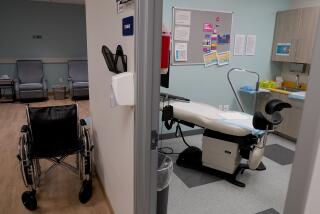No regrets: Reclaiming abortion as a force for social good
You’d think from the frenzy of anti-abortion regulations that have swept the country in the last few years that Americans have decided abortion should be outlawed.
They have not, although it’s become wildly unfashionable, if not downright revolutionary, to speak of abortion as an unmitigated social good.
And now, here come two authors, physician and abortion scholar David Grimes and essayist Katha Pollitt, to do just that. Each has written a new book aimed at countering the dire messages abortion opponents have tried to pound into our psyches: abortion is murder, abortion causes lifelong regret, fertilized human eggs are people, too.
If you examine the statistics about families, health and abortion, as Grimes does in “Every Third Woman in America: How Legal Abortion Transformed our Nation,” it’s clear life is better for women and their families when abortion is legal. (The title refers to the number of women who will have had an abortion by the time they reach menopause.)
Among the scientifically supported conclusions:
Abortion is safer than pregnancy. Before Roe vs. Wade, poor, non-white women disproportionately suffered and died from illegal abortions. The availability of abortion enables many families to have children they would not have otherwise had. Large, longitudinal studies have found no evidence of harmful psychological effects on women who have abortions. Rates of child abuse are inversely related to abortion availability.
“Abortion is good for you, your family and society,” Grimes, 68, told me in a phone conversation last week.“It’s a win-win-win.”
Grimes, who retired last year from the University of North Carolina School of Medicine, decided to tackle the subject because he fears that legal abortion, despite its endangered status in some places, has become a victim of its own success. “An entire generation,” he said, “has grown up unaware of how bad it was before Roe vs. Wade.”
How bad was it? Really, if you don’t know, just ask your mother or grandmother.
In the 1940s, the decade of his birth, Grimes writes, “more than 1,000 women were known to have died each year from complications of abortion.”
For the 1950s, said Grimes, the best survey data indicates that between 200,000 and 1.2 million illegal abortions took place each year in the U.S.
Of course, abortion remains legal in the U.S., but conservative legislatures around the country have chipped away at the right in so many ways -- by requiring waiting periods, parental consent and ultrasound exams.
A new generation of laws -- “targeted regulation of abortion providers,” or TRAP laws -- have imposed medically unnecessary restrictions on abortion clinics and abortion doctors. The rules are so onerous they are driving clinics out of business under the pretense of making them safer. Which is precisely the point.
One bright note, according to Grimes, is that the once-thinning ranks of physicians trained in abortion procedures is no longer as big a concern as it was 20 years ago. Despite the physical violence inflicted on abortion doctors -- including, most recently, George Tiller, who was murdered in the vestibule of his church in 2009 by a Christian extremist -- more and more young physicians are learning how to perform abortion care.
“There’s been a complete sea change,” said Grimes. “Many residencies now have training programs and there are 20 to 30 that have fellowships where residents can get advanced clinical training.”
Thanks to several physicians at UC San Francisco, including Jody Steinauer, who founded the group Medical Students for Choice, he said, “There’s a big cadre of motivated people now.”
Pollitt’s new book, “Pro: Reclaiming Abortion Rights,” surveys the landscape and finds that women have been forced into a defensive crouch when it comes to exercising their constitutional right to abortion.
Abortion opponents have succeeded in so stigmatizing the procedure that even pundits who favor or at least accept it suggest that women who avail themselves of this right exercise it with proper doses of regret or shame.
She quotes Naomi Wolf, who “urged women who ended their pregnancies to feel guilt,” and Andrew Sullivan, who said “abortion is always and everywhere a moral tragedy.” Pollit concludes that “the safest position for a member of the commentariat seems to be: You can have your abortion as long as you feel really, really bad about it.”
Well, enough of that, Pollitt says.
“We need to see abortion as an urgent practical decision that is just as moral as the decision to have a child – indeed, sometimes more moral,” she writes. “I want us to start thinking of abortion as a positive social good and saying this out loud.”
Please follow me on Twitter: @robinabcarian
More to Read
Start your day right
Sign up for Essential California for news, features and recommendations from the L.A. Times and beyond in your inbox six days a week.
You may occasionally receive promotional content from the Los Angeles Times.






